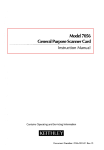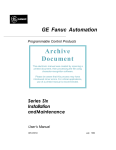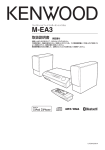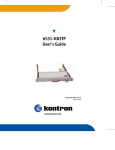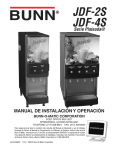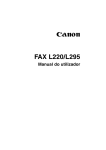Download Model 130A/131 Digital Multimeter Instruction Manual
Transcript
APPLICATIONS DEPT. mmm Model 130A/131 28775 AURORA ROAD CLEVELAND, OHIO 44139 U.S.A. 1216) 248-0400 Publication Date: June 1984 Document Number: 130A-901-01C WARRANTY Keithley Instruments, Inc. warrants this product to be free from defects in material and workmanship for a period of two years from date of shipment. During the warranty period, we will, at our option, either repair or replace any product that proves to be defective. To exercise this warranty, write or call your local Keithley representative, or contact Keithley headquarters in Cleveland, Ohio. You will be given prompt assistance and return instructions. Send the instrument, transportation prepaid, to the indicated service facility. Repairs will be made and the instrument returned, transportation prepaid. Repaired products are warranted for the balance of the original warranty period, or at least 90 days. LIMITATION OF WARRANTY This warranty does not apply to defects resulting from unauthorized modification or misuse of any product or part. This warranty also does not apply to fuses, batteries, or damage from battery leakage. This warranty is in lieu of all other warranties, expressed or implied, including any implied warranty of merchantability or fitness for a particular use. Keithley Instruments, Inc. shall not be liable for any indirect, special or consequential damages. STATEMENT OF CALIBRATION This instrument has been inspected and tested in accordance with specifications published by Keithley Instruments, Inc. The accuracy and calibration of this instrument are traceable to the National Bureau of Standards through equipment which is calibrated at planned intervals by comparison to certified standards maintained in the Laboratories of Keithley Instruments, Inc. S PECIFICAT10 NS DC VOLTS ACCURACY (2 YEARS) +(%rdg counts) 1E0-2E0C + RANGE RESOLUTION 200mV 2 v 100 pv 1mV 10mV 100mV 1 v 20 200 1000 v v v +(0.25% + 11 M A X I M U M ALLOWABLE INPUT: 1OOOV DC or peak AC non-switched, 750V peak switched. INPUT RESISTANCE: 10MR. NORMAL MODE REJECTION RATIO: Greater than 46dB at 50Hz, 60Hz. C O M M O N MODE REJECTION RATIO: Greater than lOOdB at DC, 50Hz and 6OHz (1kQ unbalance]. AC VOLTS ACCURACY (2 YEARS)" f (Yordg counts) 1Eo-28OC + RANGE 200mV 2 v 20 v 200 v 750 V RESOLUTION 100 pv 1mV 10mV 100mV 1 v +(l% + 31 FREQUENCY RANGE 45Hz-500Hz M A X I M U M ALLOWABLE INPUT: lOOOV peak non-switched, 750V peak switched: continuous except 200mV range: 15s max above 300V. INPUT IMPEDANCE: 10MQ shunted by less than 1OOpF. RESPONSE: Average responding, calibrated in rms of a sine wave. *Above 10 counts. OHMS ACCURACY (2 YEARS) fWrdg counts) 1Eo-2E0C i(O.5% 4) (0.2% + 11 f (0.2% 1) f (0.2% 1) + ( 2 % + 11 + RANGE 200 n 2 kQ 20 k n 200 k f l 20MR RESOLUTION lOOmn 1 n 10 n 100 n 10 k f l * + + + FULL SCALE VOLTAGE < 0.5V < 0.5V > 0.7V > 0.7V > 0.7V M A X I M U M OPEN CIRCUIT VOLTAGE: 1.5V. M A X I M U M ALLOWABLE INPUT: 300V DC or rrns. DC AMPS RANGE RESOLUTION 2rnA 20rnA 200rnA 2000rnA 10 A 1 PA 10 pA 100pA 1rnA 10rnA ACCURACY (2 YEARS) k(%rdg + counts) 18"-28'C *(0.75% +(0.75% :(0.75% *(2% *(2% + + + + + 1) 1) 1) 1) 1) MAXIMUM FULL SCALE VOLTAGE BURDEN 0.25V 0.25V 0.25V 0.7 V 0.3 V OVERLOAD PROTECTION: rnA input: 2A fuse (250V), externally accessible; 10A input: 20A for 15s unfused. AC AMPS RANGE RESOLUTION 2rnA 20mA 200rnA 2000rnA 10 A 1 PA 10 pA 100pA 1rnA 10rnA ACCURACY (2 YEARS)' *(%rdg + counts) 18O-28'C (45HZ-500H~) *(2% *(2% f(2% +(3% +(3% + 2) + 2) + 2) + 5) + 5) MAXIMUM FULL SCALE VOLTAGE BURDEN 0.25V 0.25V 0.25V 0.7 V 0.3 V OVERLOAD PROTECTION: rnA input: 2A fuse (250V), externally accessible; 10A input 20A for 15s unfused. *Above 10 counts. GENERAL DISPLAY: 3 % digit LCD, 0.6' height, with polarity and range indication. OVERRANGE INDICATION: 3 least significant digits blanked. MAXIMUM COMMON MODE VOLTAGE: 500V peak. OPERATING ENVIRONMENT: Oo to 5OOC; less than 80% relative humidity up to 35OC, linearly derate 3% RH/OC from 35OC to 5OOC. STORAGE ENVIRONMENT: -35OC to 6OOC. TEMPERATURE COEFFICIENT: (Oo t o 18% and 28O t o 50°C): Less than 0.1 x applicable accuracy specification per OC. POWER: 9V alkaline or carbon-zinc battery (NEDA 1604). BAlTERY LIFE: 100 hours typical with carbon-zinc cells, 200 hours with alkaline cells. BAlTERY INDICATOR: Diplay indicates BAT when less than 10% of life remains. DIMENSIONS, WEIGHT: 178mm long x 78mm wide x 42mm thick (7.0' x 3.1" x 1.6')).Net weigth 283gm (10 0 2 . ) . ACCESSORIES SUPPLIED: Batten/, test leads and operating instructions. TABLE OF CONTENTS General Information ManualAddenda . . . . . . . . . . . . . . . . . . . . . . . . . . . . . . . . . . . . . . . . . 1 Optional Accessories . . . . . . . . . . . . . . . . . . . . . . . . . . . . . . . Preparation for Use . . . . . . . . . . . . . . . . . . . . . . . . . . . . . . . . . Battery Installation/Replacement . . . . . . . . . . . . . . . Safety Symbols and Terms . . . . . . . . . . . . . . . . . . . . Safety Precautions . . . . . . . . . . . . . . . . . . . . . . . . . . . . . . . . . . . . . . . 4 Operation Safety Precautions for High Energy Circuits . . . . . . . . . . . . . . . . . 6 Servicing Information Dissassembly Instruction . . . . . . . . . . . . . . . . . . . . . . . . . . . . . . . . . . 8 Calibration . . . . . . . . . . . . . . . . . . . . . . . . . . . . . . . . . . . . . . . . . . . . . 10 Calibration Procedure . . . . . . . . . . . . . . . . . . . . . . . . . . . . . . . 10 PartsList . . . . . . . . . . . . . . . . . . . . . . . . . . . . . . . . . . . . . . . . . . . . . . 11 GENERAL INFORMATION The Model 130A Digital Multimeter is supplied ready for use with a battery. Descriptions of other available accessories, and other general information concerning the instrument can be found below. MANUAL ADDENDA Information contained in this manual is believed to be accurate at the time of printing. Any improvements or changes to this manual will be documented in an addendum which will be included with the, instrument. OPTIONAL ACCESSORIES Model 1301 Temperature Probe is a rugged low cost temperature probe designed to allow precision temperature measurement from -55OC to 150OC. Model 1304 Soft Carrying Case and Stand Model 1306 Deluxe Case is a rugged DMM carrying case that is large enough to accomodate the Model 130A plus various other DMM articles such as a spare battery, test leads, etc. Model 1309 Spare Parts Kit is a collection of specially selected parts to maintain up to ten Model 130A DMMs for one year. Model 1600A High Voltage Probe extends the DMM to 40kV. It has a 1OOO:l division ratio, which means that 1V on the DMM corresponds to 1kV. Model 1651 50-Ampere Shunt allows current measurements to be made up to 50-amperes. It is a 0.0010 1% Cterminal shunt. When the DMM is set to the 2V range, a 50-ampere current will correspond to 50mV (.0500V). Model 1681 Clip-On Test Lead Set contains two leads, 1.2m(48 inches) long, terminated with banana plug and spring action clip-on probe. Model 1682A RF Probe allows voltage measurements from 100kHz to 250MHz. Model 1683 Universal Test Lead Kit consists of two test leads, 1.2177 (48 inches) long with 12 screw-in tips, two banana plugs, two spade lugs, two alligator clips with boots, two needle tips with chucks and four heavy-duty tip plugs. 1 Model 1685 Clamp-On AC Current Probe measures AC current by clamping onto a single conductor. Interruption of the current path is unnecessary. The Model 1685 detects current by sensing magnetic field produced by current. Model 1691 General Purpose Test Lead Set consists of two .91m (36 inches) test leads with probe tips terminated in banana plugs. PREPARATION FOR USE Carefully unpack the Model 130A from its shipping carton and inspect for any obvious signs of physical damage. Report any damage to the shipping agent a t once. The following items are included with every Model 130A shipment. 1. Model 130A DMM 2. Model 130A Instruction Manual 3. 9V Battery NEDA 1604 4. Test Leads 5. Accessories as ordered. BATTERY INSTALLATION/REPLACEMENT The battery is accessible from the bottom of the instrument. Note the precautions on the case before installing or replacing the battery. WARNING Turn the Model 130A off and disconnect test leads before replacing the battery. Put the cover back into place on the compartment before resuming use of the instrument. A 9V battery is supplied with the instrument but not installed. To install or replace the battery, remove the cover from the battery compartment by sliding it off in the direction of the arrow located on the battery cover. The battery connector snaps on and off the terminal of the battery. Improper installation of the battery will cause the connecting wires to be severed by excess strain. Proper installation requires that the battery be positioned in such a manner (see drawing) that the leads protruding from the boot of the battery connector face toward the outside of the battery compartment. If the instrument is going to be stored for a long period of time or in a high temperature environment, remove the battery to prevent leakage damage. 2 R103 Figure 1. Battery Installation SAFETY SYMBOLS AND TERMS A The symbol on the instrument denotes that the user should refer to the operating instructions. The symbol on the instrument denotes that up to lOOOV may be present on the terminal(s). The WARNING used in this manual explains dangers that could result in personal injury or death. The CAUTION used in this manual explains hazards that could damage the instrument. r/ 3 SAFETY PRECAUTIONS The following safety precautions should be observed before operating the Model 130A DMM. 1 . This instrument is intended for use by qualified personnel who recognize shock hazards and are familiar with the safety precautions required to avoid possible injury. Read over the manual carefully before operating this instrument. 2. Exercise extreme caution when a shock hazard is present at the instrument's input. The American National Standards Institute (ANSI) states that a shock hazard exists when voltage levels greater than 30V rms or 42.4V peak are present. A good safety practice is to expect that a hazardous voltage is present in any unknown circuit before measuring. 3. Inspect the test leads for possible wear, cracks or breaks before each use. If any defects are found, replace with test leads that have the same measure of safety as those supplied with the instrument. 4. For optimum safety do not touch the test leads or the instrument while power is applied to the circuit under test. Turn the power off and discharge all capacitors, before connecting or disconnecting the instrument. 5. Do not touch any objects which could provide a current path to the common side of the circuit under test or power line (earth) ground. Always make measurements with dry hands while standing on a dry, insulated surface, capable of withstanding the voltage being measured. 6. Exercise extreme safety when testing high energy power circuits (AC line of mains, etc.). Refer to the operation section. 7. Do not exceed the instrument's maximum allowable input as defined in the specifications and operation section. 4 OPERATION The following paragraphs contain information concerning basic operation of the Model 130A. It is recommended that this information be reviewed before attempting to operate the Model 130A. Low Battery Indicator Minus sign indicates negative values. Plus sign implied. An over range condition is indicated by a “1“ followed by a blank display. S ‘ ET POWER ON (slide switch located on side of instrument). ELECT F U N C T I O N A N D RANGE DCV-20OmV, 2V, 20V, 200V or 1ooov ACV-200mV, 2V, 20V, 200V, or 1ooov NOTE: 750VAC is maximum allowable AC input. D C A -2 m A, 20mA, 200mA, 2000mA or 10A ACA-2mA, 20mA, 200mA, 2000mA or 10A 0-2003, 2k0, 20k0, 200kR or 20M0 -INPUTS-Selects appropriate pair of input jacks. COM, V-0-for all voltage and resistance measurements. COM, mA-for current measurements up to 2000mA. 10A, COM, 10A, HI-for current measurements up to 10A. fl Figure 2. Front Panel Controls WARNING Do not apply more than 500V peak above earth ground t o the COM input jack. 5 CAUTION Do not under any circumstance, use the 10A COM or 10A HI input jacks with the COM input jack for making measurements. This is a short and will damage the instrument. SAFETY PRECAUTIONS FOR HIGH ENERGY CIRCUITS To optimize safety when measuring voltage in high energy distribution circuits, read and use the directions in the following warning. WARNING Dangerous arcs of an explosive nature in a high energy circuit can cause severe personal injury or death. If the meter is connected t o a high energy circuit, when set t o a current range, l o w resistance range or any other l o w impedance range, the circuit is virtually shorted. Dangerous arcing can result even when the meter is set t o a voltage range if the minimum safety spacing is reduced. When making measurements in high energy circuits use test leads that meet the following requirements: 1. Test leads should be fully insulated. 2. Only use test leads than can be connected to the circuit (e.g. alligator or spade plugs) for a hands-off measurement. 3. Use test leads that do not reduce the arc protection by decreasing the voltage spacing. Use the following sequence when testing power circuits: 1. De-energize the circuit using the regular installed connectdisconnect device such as the circuit breaker, main switch, etc. 2. Attach the test leads to the circuit under test. Use appropriate safety rated leads for this application. 3. Set the DMM to thg proper function and range. 4. Energize the circuit using the installed connect-disconnect device and make measurements without disconnecting the DMM. 5. De-energize the circuit using the installed connect-disconnect device. 6. Disconnct the test leads from the circuit under test. 6 SERVICING INFORMATION This section contains servicing information for the Model 130A. WARNING All service information is intended for qualified electronic maintenance personnel only. FUSE CHECK With the instrument set to the 2kQ range, connect a jumper from the V-Q jack to the mA jack. The display should read approximately .loo. An overrange display would typically indicate a blown fuse. A display reading other than approximately .lo0 could indicate a defective current input circuit (seeschematic). FUSE REPLACEMENT A 2-amp fuse protects the 2mA through 2000mA current ranges. To gain access to the fuse, remove the fuse Compartment cover in the same manner as removing the battery compartment cover. WARNING Turn off the Model 130A and disconnect the test leads before replacing the fuse. Reinstall fuse compartment cover before attempting to operate the instrument. Remove the fuse by pulling outward on the plastic tab that encircles the fuse body. Install the plastic tab on the new fuse and snap the fuse back into the fuse holder. Do not replace the fuse with a higher rated value or instrument damage that is not covered by the warranty may occur. DIODE TEST The 20kQ range can be used for testing of semiconductor junctions. A junction is probably good if the Model 130A indicates an overrange reading when the semiconductor is reversed biased, and an on-range reading, when the semiconductor is forward biased. (The V-fl jack is positive). 7 DISASSEMBLY INSTRUCTIONS Place the unit face down on a bench or other similar surface and remove the battery compartment cover. Disconnect and remove the battery. Remove the two #4-40 X 7/8 retaining screws. Grasp the bottom cover at the input jack end and with a lifting and forward pushing motion (see drawing), carefully remove the bottom cover. While removing the cover, feed the battery connector through the access hole in the bottom of the battery compartment. The component side of the PC board is now exposed and the battery can be reconnectedfor troubleshooting. To read the display, some light downward pressure at the top of the circuit board may be required in order to make contact through the elastomer contact strip between the circuit board and the LCD. The PC board and LCD assembly are not secured once the case retaining screws are removed. Be careful not to allow the PC board and LCD assembly to fall out or shift out of position during calibration. To remove the PC board from the top cover, grasp the function switch assembly and lift until the input jacks become disengaged from the cover. The PC board can now be removed using a slight clockwise motion to free the two switch knobs from their normal positions in the case. The LCD assembly will remain in the top cover when the PC board is removed. Again, be careful not to allow the LCD assembly to fall out accidentally. The two switch knobs and bushings can be removed from the PC board assembly by simply pulling them off the switch shafts. The LCD assembly, along with the zebra strip connector, lifts out of the case. To reassemble the Model 130A, remove the cover on the fuse cornpartment (to position fuse pulling tab) and reverse the above procedures. Be sure to replace the on-off switch cover. Common-mode voltage will be present on the switch, creating a possible hazard if the cover is not replaced. 8 1 t ! LIFT PUSH FORWARD c-- , I I I I I Figure 3. Rear Panel Removal TOP CASE Figure 4. Model 130A Exploded View 9 CALI BRATION Calibration should be performed every two years or whenever the instrument is known to be out of specification. Calibration should be done at an ambient temperature of 23O f3OC ( 7 7 O f5OF), with a relative humidity of less than 80%. Equipment Needed: or better. + 190mV DC voltage source with -05% accuracy Model 130A Settings: DCV function, 200mV range, V-s2 and COM input jacks. CALIBRATION PROCEDURE Remove the battery cover to gain access to the calibration pot R103 (see Figure 1). Apply the 190mV to the Model 130A input and adjust R103 for a display reading of 190.0 f 1 digit. This is the only adjustment needed to calibrate the instrument. Calibration should be performed every two years. + 10 Model 130A Parts List Circuit Deslg. BT101 c101 c102 C103 C104 C105 C106 C107 C108 c109 c110 c111 c112 C113 CR101 CR102 CR103 CR104 CR105 CR106 CR107 CR108 CR109 DS101 F101 J1001 J1002 J1003 J1004 J1005 J1006 Q101 Q102 R101 R102 R103 R104 R105 R106 R107 Sch Description Battery, 9V, NEDA 1604 Capacitor, 1lOpF, 500V, Mica Capacitor, .047pF, lOOV, Polyester Capacitor, .047pF, lOOV, Polyester Capacitor, .IFF, lOOV, Polyester Capacitor, .lpF, 16OV, Polypropylene Capacitor, 1.5pF, 20V, Tantalum Capacitor, 4.7pF, 20V, Tantalum Capacitor, 1.5pF, 20V, Tantalum Capacitor, .02pF, lOOOV, Ceramic Disc Capacitor, .IFF, 50V, Ceramic Capacitor, .1pF, 50V, Ceramic Capacitor, lpF, 20V, Tantalum Capacitor, 4.7pF, 20V, Tantalum Rectifier, l A , 800V Rectifier, 75mA, 75V Rectifier, 75mA, 75V Rectifier, 75mA, 75V Rectifier, 75mA, 75V Rectifier, 75mA, 75V Rectifier, 3A, 50V Rectifier, 3A, 50V Rectifier, 75mA, 75V Liquid Crystal Display Connector, Strip Fuse, 2A,250V, 3AB, Ceramic Body Jack, Input Jack, Input Jack, Input Jack, Input Jack, Input Connector Battery Transistor, NPN, Switch, 2N3904 Transistor, NPN, Silicon, GES5818 Thick Film Resistor Network Thick Film Resistor Network Pot, 500Q Thick Film Resistor Network Resistor, lMQ, lo%, lW, Comp Resistor, .lo, .5%, lW, WW NOT USFD Keithley LOC Pert No. - c4 H3 F3 E4 G3 G3 04 D2 D4 c2 c2 D2 D2 F1 c4 C6 c2 c2 D2 D2 A4 84 83 G5 A4 A1 A4 A4 85 85 c4 E5 E3 SEV SEV G2 B3,B4 E4 84 BA-14 C-320-11OP C-308.047 C-305,047 C-305.1 C-306.1 C-3141.5 C-314-4.7 C-314-1.5 C-316.02 C-238.1 C-238.1 C-3251 C-3194. I R F-38 RF-28 RF-28 RF-28 RF-28 RF-28 RF-34 RF-34 RF-28 DD-27 CS-3762 FU-62 130A-303 130A-303 13OA-303 130A-303 130A-303 BH-29 TG-47 TG-138 TF-97 TF-119 RP-119-500 TF-94 R-2-1M R-279.1 11 Model 130A Parts List (Cont.) ~~ Circuit Desig. R108 R109 R110 R111 R112" R113 R114 R115 R116 R117 R118 R119 R120 R121 R122" R123" 4T101 s101 s102 S103 u101 u102 U103 VRlOl ~~ Sch lescription aesistor, 1000, .1%, 1/1OW, MtF Resistor, 9000, . l % , l/lOW, MtF Resistor, 9k0, ,l%, 1/1OW, MtF Resistor, 90k0, . l % , l/lOW, MtF Resistor, 900k0, .l%, 1/1OW, MtF Resistor, 100k0, lo%, lW, Comp NOT USED Resistor, 4.72k0, .l%, 1/1OW, MtF Resistor, 10k0, , l % , l/lOW, MtF Thick Film Resistor Network Resistor, 0.010, 0.5%, lW, WW NOT USED NOT USED NOT USED Resistor, 9M0, .08%, 2W Thick Film Resistor Network Thermistor, 8mA, 500V, PTC Switch, SPDT, ON-OFF Switch, Rotary, Range Switch, Rotary, Function 3 1/2-Digit Single Chip A/D Converter CMOS Quad Exclusive OR Gate Low-Power JFet-Input OP-Amp Diode, Low Voltage Reference Supplied Test Lead Set Keithley Part No. LOC R-283-100 83 82 B2 82 82 c1 R-283-900 R-283-9k R-283-90k R-283-900k R-2-1OOk D3 02 S EV B5 R-283-4.71k R-283-10k TF-96 R-280-.01 81 B1 R-281-9M TF-104 E2 c4 S EV E2, F2 G4 RT-7 SW-417 SW-432 sw-433 32440 F5, F6 c2 G1 30847 IC-227 DZ-62 CA-8 ~ "R123 may be installed in your unit in place of R122 and R1 configuration). ALTERNATE CONFIGURATION 12 (see alternate COMPONENT LAYOUT 13 SCHEMATIC DIAGRAM $'" INPUT I I 15 SERVICE FORM M o del No. Serial No. ~ Name P.O. No. date Phone Company Address City State Zip List all control settings and describe problem. (Attach additional sheets as necessary.1 Show a block diagram of your measurement system including all instruments connected (whether power is turned on or notl. Also describe signal source. Where is the measurement being performed? (factory, controlled laboratory, out-of-doors, etc.1What power line voltage is used? Variation? Frequency? Ambient Temperature? Variation? O F . Rel. Humidity? Other? OF. Any additional information (If special modifications have been made by the user, please describe below 1 ‘Be sure t o Include your name and phone number an this sewice form Keithlsy Instruments. lnc./28775 Aurora RoadiCleveiand, Ohio 44139/U.S.A./(2161 2484400/Teiex: 985469 WEST GERMANY: Keithlsy Inatruments GmbH/Heiglhofstrasse 5/D-8000 Munchen 70/314 289/Telex: 1345000 GREAT BRITAIN: Keithlsy Instrurnenta. Ltd./l, Boulton RoadiReading, Berkshire RG2 ONL110734) 88 12 87/Telex: 847047 FRANCE: Keithlsy Instruments SARL/2 Bis, Rue LBon Blum/B.P. 60/91121 Palaiseau Cedexll61 0115 155/Telex: 600933 NETHERLANDS: Keithley lnatrumentr BV/Arkelsedijk 4/NL4206 AC Gorinchem/(01830l 25577/Telex: 24 684 SWITZERLAND: Keithlsy Inatruments SAIKriesbachstr. 4/CH-8660 DubendorfiOl 821 94 44/Telex: 57 536 AUSTRIA: Keithley Instruments Gss.m.b.H/Doblinger Hauptstr. 32/A-1190 Wien/0222 314 289/Telex: 134500





















